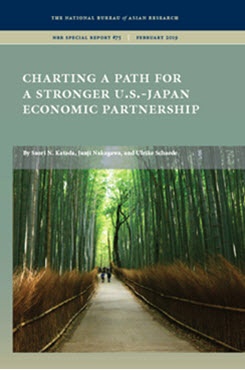U.S.-Japan Business Relations and the Trade War with Asia
This essay analyzes the current U.S.-Japan trade relationship and assesses the consequences of the U.S. trade war for bilateral relations.
EXECUTIVE SUMMARY
MAIN ARGUMENT
The Trump administration’s protectionist trade policies will affect U.S.-Japan relations at multiple levels. Japan’s economic structure has changed fundamentally over the past two decades, and the country is now the technology anchor of many Asian supply chains. For Japan, China is a much more important trading partner than the U.S. Regarding bilateral U.S.-Japan trade negotiations, it is important to weigh the potential short-term gains from higher tariffs against deep-rooted technology dependencies and long-standing business collaboration, including Japan’s funding of U.S. innovation and ownership of large companies and plants in the U.S. In the pan-Asian context, in the long run, both the U.S. and Japan may benefit from a diversification of trading partners in Asia, and the trade war is already having this effect. But in the short term, the Trump administration’s approach will increase uncertainties and may stall regional economies. Recent initiatives to increase economic collaboration between Japan and China raise the risk that the U.S. could be marginalized in Asia.
POLICY IMPLICATIONS
- Due to the globalization of supply chains, U.S. tariffs on Chinese and Japanese goods are bound to affect all Asian economies. China’s role in the production chain cannot be replaced overnight. Even if a diversification of production sites in Asia will benefit the region in the long run, this transition will take time.
- Japan is much more critical to the U.S. economy than the bilateral trade statistics indicate. The Japanese economy has fundamentally changed since the 1990s, with Japan becoming one of the U.S.’s most important technology collaborators and investors in the private sector. Japan can no longer be taken for granted, and U.S. trade policies that alienate this critical ally may prove costly.
- Japan has become the technology anchor of trade in Asia. While the U.S. continues to be important for Japan, Japanese trade with China and within Asia is now much larger. The new trade war thus risks pushing Japan toward China.
Ulrike Schaede is Professor of Japanese Business in the School of Global Policy and Strategy at the University of California San Diego.



